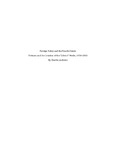| dc.rights.license | In Copyright | en_US |
| dc.creator | Andrews, Charles Sackett | |
| dc.date.accessioned | 2013-01-16T18:27:41Z | |
| dc.date.available | 2013-01-16T18:27:41Z | |
| dc.date.created | 2012 | |
| dc.identifier | WLURG38_Andrews_HIST_2012 | |
| dc.identifier.uri | http://hdl.handle.net/11021/23750 | |
| dc.description | Thesis; [FULL-TEXT FREELY AVAILABLE ONLINE] | en_US |
| dc.description | Charles Sackett Andrews is a member of the Class of 2012 of Washington and Lee University. | en_US |
| dc.description.abstract | The term "Vietnam syndrome" emerged in the aftermath of the war, used to describe the American people's reluctance to support any potentially open-ended or prolonged military engagement. Post-Vietnam presidents argued that this "syndrome" handicapped their ability to conduct foreign policy and prevented or restricted necessary military intervention in foreign nations. President Bush's statements after the Gulf War emphasized the lingering affects of Vietnam on the government and the people. His pleasure in the popular support for the "troops" and the military's "objectives," as well as their commitment to "justice," and determination "to fulfill [America's] obligations," subtly referred to beliefs and myths about specific American groups and institutions that emerged after the war. Bush's emphasis on support stemmed from the belief that the anti-war movement and the public's failure to support the war's anti-communist objectives led to an American defeat in Vietnam. This understanding accompanied the assumption that the press had assisted in the nation's ignominious withdrawal. This "liberal" media conspiracy accused the press of deliberately undermining the war effort in Southeast Asia. Presidents Lyndon B. Johnson and Richard Nixon cultivated and perpetuated this myth during their presidencies, and it has since developed into "conventional wisdom" in parts of the American society. This understanding of the press in Vietnam is flawed; a media conspiracy aimed at ending the military operations in Southeast Asia never existed. [From the Introduction] | en_US |
| dc.description.statementofresponsibility | Charlie Andrews | |
| dc.format.extent | 69 pages | en_US |
| dc.language.iso | en_US | en_US |
| dc.rights | This material is made available for use in research, teaching, and private study, pursuant to U.S. Copyright law. The user assumes full responsibility for any use of the materials, including but not limited to, infringement of copyright and publication rights of reproduced materials. Any materials used should be fully credited with the source. | en_US |
| dc.rights.uri | http://rightsstatements.org/vocab/InC/1.0/ | en_US |
| dc.subject.other | Washington and Lee University -- Honors in History | en_US |
| dc.title | Foreign Policy and the Fourth Estate: Vietnam and the Creation of the "Liberal" Media, 1954-2003 (thesis) | en_US |
| dc.type | Text | en_US |
| dcterms.isPartOf | RG38 - Student Papers | |
| dc.rights.holder | Andrews, Charles Sackett | |
| dc.subject.fast | Mass media -- Moral and ethical aspects | en_US |
| dc.subject.fast | War -- Press coverage | en_US |
| dc.subject.fast | History | en_US |
| dc.subject.fast | Vietnam War, 1961-1975 | en_US |
| dc.subject.fast | Mass media and the war | en_US |
| local.department | History | en_US |
| local.scholarshiptype | Honors Thesis | en_US |
